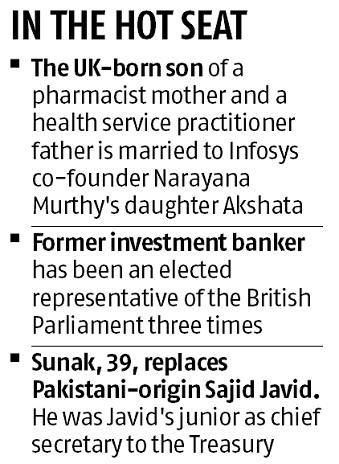When former British foreign secretary William Hague vacated his safe Conservative party seat in Richmond in the countryside of Yorkshire, a surprise choice to step into his shoes was an Indian-origin candidate, Rishi Sunak.
This was five years ago. While he has been thrice elected from the constituency to the House of Commons, because of two mid-term elections, his rise from the back benches to the office of the chancellor of the exchequer (finance minister) in merely half a decade is, to say the least, meteoric.
Sunak’s father was a doctor in the National Health Service and his mother an owner of a chemist shop. “I grew up watching my parents serve our local community with dedication ... I wanted to make that same positive difference to people as their Member of Parliament,” he said after entering the Commons.
His parents sent him to Winchester, a distinguished institution in the British public school tradition — along with Eton, Harrow, Rugby, and some others — and attended by Tiger Pataudi and Madhavrao Scindia.
He did well enough there academically to secure admission to the University of Oxford.
Following this he studied at Stanford in the US. Experience at the three institutions, he recorded, “changed my life”. At Stanford, he met a fellow student called Akshata, who later became his wife. Akshata is the daughter of Narayana Murthy, one of the promotors of Infosys. While much of the British media didn’t have a clue about this or didn’t care, their Indian counterpart immediately recognised Sunak, when he was first elected MP, as Murthy’s son-in-law.

His career as a businessman, though, began even before he completed his higher education — at his mother’s chemist shop.
He proceeded to co-found a large investment firm, working with companies from Silicon Valley to Bengaluru. A year and a half ago Theresa May, then PM, appointed Sunak minister of state for local government. Johnson, a fellow Oxonian, elevated him to chief secretary to the Treasury, who ranks between minister of state and secretary of state and attends cabinet meetings.
A cabinet reshuffle was predicted after Britain quit its membership of the European Union on January 31. British journalist Steve Richards, a co-commentator on the BBC’s Dateline, made a stunning claim on the programme a couple of weeks ago, when he described the then chancellor, Sajid Javid, as the weakest ever and asserted 10 Downing Street or the Prime Minister’s Office was writing next month’s Budget proposals rather than he or his office. Richards was remarkably accurate.
Javid, son of a bus driver of Pakistani origin and himself a former banker, resigned on Thursday after he was, reportedly, asked to sack his political advisers by No 10. The Guardian quoted “a source close to Javid” as saying: “The chancellor said no self-respecting minister would accept those terms.” He has in recent months often clashed with Johnson’s senior adviser Dominic Cummings, who enjoys the PM’s confidence.
In August, Cummings fired Javid’s press secretary, Sonia Khan, without consulting him after alleging she was responsible for leaks, which she denied.
That Sunak was rapidly moving up the ladder and had been incorporated into Johnson’s inner circle was evident for a while. He impressed at the Treasury and there was a greater meeting of minds between him and the PM, who even put him up for TV interviews. His reputation among Conservative colleagues is one of “a guy who knows his stuff”, but is lacklustre with the media. Sunak’s interests include cricket and football. More importantly, he has the onerous responsibility of presenting a Budget in less than a month.
Alok Sharma, also of Indian origin, has been promoted from international development secretary to business secretary (which is equivalent to minister for commerce and industry). He will also be the minister in charge of the Cop26 climate summit in Glasgow in November. It was speculated Priti Patel, who is of East African Indian descent and is home secretary, may suffer from Johnson’s cull. But with her retaining her position, three persons of Indian extraction are key Cabinet ministers in the British government.
